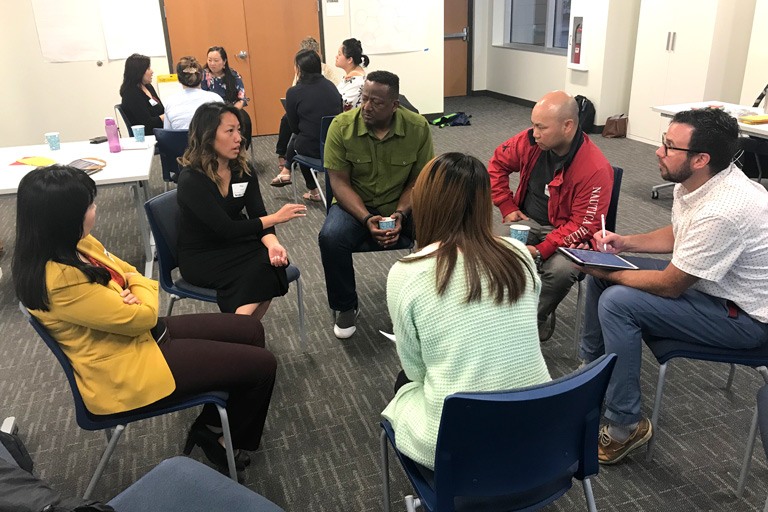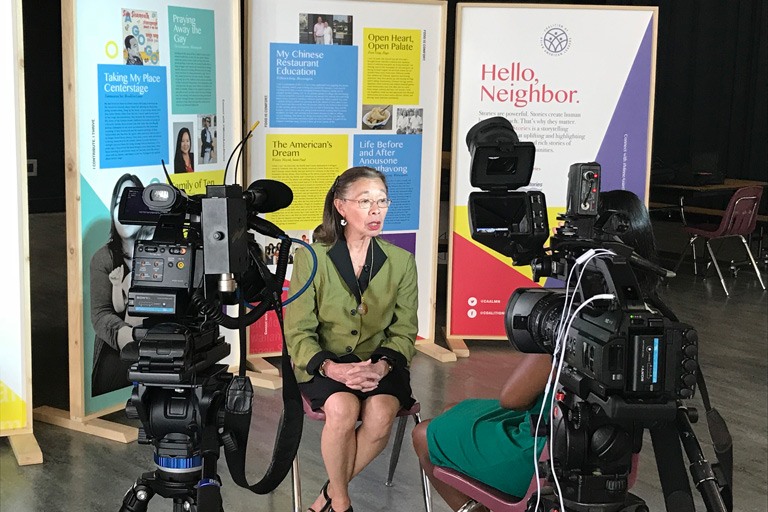Coalition of Asian American Leaders (CAAL)

Photo (L-R): KaYing Yang, Jay Colond, Kay Moua, and Bo Thao-Urabe, staff of Coalition of Asian American Leaders
Too often, those experiencing systemic inequities aren’t at the table where decisions are made. Bo Thao-Urabe, KaYing Yang, Jay Colond and Kay Moua are out to change that. As the founder and executive director of Coalition of Asian American Leaders (CAAL), Bo and the CAAL team are breaking down structural barriers to power so all Minnesotan’s can have influence over their future, no matter their background. “All of our work is about trying to understand what the real lived experiences are and what’s not working well for people in various systems,” said Bo. “We’re here to be systems translators rather than be the translators for the community to the systems.”
“We believe the people who are experiencing inequities are best positioned to find the best solutions.”
Bo Thao-Urabe, Founder and Executive Director, Coalition of Asian American Leaders (CAAL)
CAAL’s values are firmly grounded in social justice. “We believe the people who are experiencing inequities are best positioned to find the best solutions. We have to acknowledge the privileges we have simply by being staff,” said Bo. “We don’t start on the premise that we’re the leaders.”
CAAL’s work is giving voice to the diversity of experiences within the broad heading of “Asian American.” In Minnesota, that label covers over 40 cultural communities, all with different paths to the state, different histories, and unique needs and assets. CAAL doesn’t shy away from that complexity, but rather embraces it to build understanding and common agendas.
While CAAL uses data to inform their work and describe the diversity of the human condition for Asian Americans in Minnesota, CAAL’s team knows that story sharing holds the real power. “I often say ‘once people hear a story, they can’t un-hear it,’ whereas with data, people won’t remember it,” Bo said. “For a community like ours where there’s so much diversity within the diversity, hearing each other’s stories is essential for strengthening relationships across communities so we can work together to make systemic change.”

Autonomy with Fiscal Sponsorship
CAAL started out with a national organization, but when they decided to branch off to retain a local focus and have more decision-making authority, they turned to Propel Nonprofits’ (then MAP for Nonprofits) new fiscal sponsorship program. “It was a good fit, because we got to a place where we wanted more local self determination, but we needed a 501(c)(3) structure to be able to grow our work,” said Bo. “CAAL’s leaders care about the community but they also wanted to be intentional about what we would become. Our relationship with Propel Nonprofits allowed us to focus on the work until the point where it made sense for us to independently spin off.”
Shaping the Ecosystem through Strategic Partnerships
CAAL understands the power of intentional partnerships to changes systems, and redistributing power requires building a supportive ecosystem. For Bo, experts aren’t always the leaders; rather, leaders know what expertise they have (whether that be a lived experience, a skill, or resources), and they proactively seek to use that expertise to cause change. That’s just what CAAL did with Propel Nonprofits.
Though CAAL has benefitted from Propel’s expertise, they’ve also grown Propel’s capacity to concretely advance racial equity work. CAAL’s team advocated with Propel Nonprofits’ staff at the capital for funding for the Nonprofit Infrastructure Grant Program, which Propel Nonprofits ultimately administered. This new program provides infrastructure grants to 21 small, culturally led nonprofit organizations. “We can’t just talk about racial equity if we’re not going to invest in and build up organizations that are led by communities and serve the communities we’re talking about – indigenous and people of color communities,” said Bo.

Accounting for Growth, Focusing on Mission
Not only did CAAL help Propel pilot its fiscal sponsorship program and craft the Nonprofit Infrastructure Grant Program, it recently became one of the first Propel Nonprofits clients in a new accounting pilot program. Propel Nonprofits’ new pilot responds to the sector’s need for strategic, affordable accounting services. It goes beyond transactional financial reporting to being a financial strategy partner for nonprofits.
For organizations like CAAL that are still building up their capacity, having in-house accounting expertise is not always possible. “With this new service we have someone there as we grow. Someone’s there to help with accounting services, and someone’s there to help us build up our internal systems for financial due diligence,” said Bo. “I’m grateful to have multiple layers of expertise, from basic financial reconciling and reporting to the strategizing about how we think about our growth to what we might consider as build financial models to match our strategies – it’s more than we would be able to find in one person at this time.”
For Bo, the mission is personal. “I think about my daughter and what we’re leaving behind for her. I’m not satisfied that she’s going to grow up in a world that won’t fully embrace her. So, I can’t be idle. I know change demands our constant participation.”
Related Services
-
Accounting & Finance
Propel Nonprofits’ accounting and finance services are designed to equip your team with decision-level data while also building financial leadership and confidence within your nonprofit.
-
Fiscal Sponsorship
Propel Nonprofits’ fiscal sponsorship program works with dozens of mission-driven organizations, projects, causes, and collaborations to test drive new ideas as you build infrastructure, set goals, develop your business model, and get your big idea off the ground.
